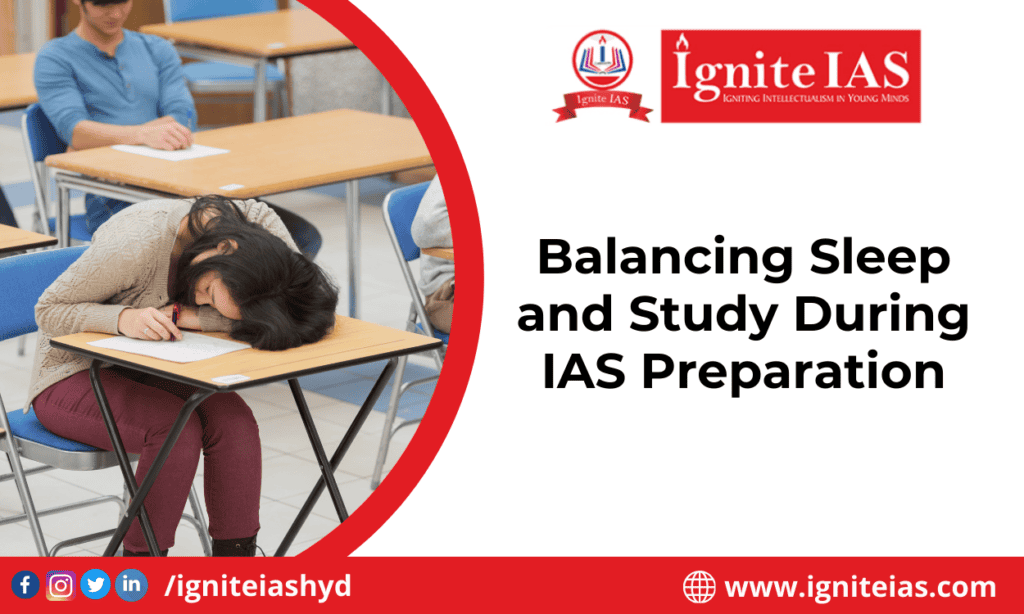The journey to cracking the IAS exam is demanding, requiring long hours of study and relentless dedication. However, many aspirants often overlook one of the most crucial components of success: sleep. Balancing sleep and study is not just about resting; it’s about maximizing productivity and ensuring long-term well-being. Let’s explore how to achieve this delicate balance.
Introduction
Does it feel like 24 hours aren’t enough to prepare for the IAS exam? You’re not alone! Many aspirants sacrifice sleep to squeeze in extra study hours. But here’s the truth: depriving yourself of sleep can be counterproductive. Sleep is not a luxury; it’s a necessity that sharpens your focus and boosts your memory. Striking the right balance between sleep and study can help you perform at your best.
1. Why Sleep is Essential for IAS Aspirants?
Sleep is more than just rest—it’s when your brain processes information, consolidates memories, and rejuvenates itself. Skipping sleep might give you extra hours to study, but it will cost you in terms of focus and efficiency.
2. The Science Behind Sleep and Memory
Did you know that your brain organizes and stores information while you sleep? This process, known as memory consolidation, ensures that what you learn during the day sticks with you. Lack of sleep disrupts this critical function.
3. How Sleep Impacts Productivity?
Sleep-deprived individuals experience reduced attention spans, slower problem-solving abilities, and increased stress. For IAS aspirants, who need razor-sharp focus, cutting down on sleep is a recipe for burnout.
4. Setting a Consistent Sleep Schedule
Consistency is key to balancing sleep and study. Aim for 6-8 hours of sleep every night and stick to a fixed bedtime. Your body thrives on routine, and regular sleep patterns enhance your overall health and cognitive function.
5. Optimizing Study Hours
Instead of cramming, focus on studying smarter. Use techniques like the Pomodoro Technique to break your study sessions into manageable chunks. This ensures better retention without overwhelming your mind or cutting into sleep time.
6. Power Naps: A Game Changer
A 20-minute nap in the afternoon can recharge your brain and improve concentration. Just make sure it doesn’t exceed 30 minutes, as longer naps can make you groggy.
7. Managing Night Owls vs Early Birds
Are you more productive at night or early in the morning? Identify your natural rhythm and plan your study schedule accordingly. Remember, quality study time matters more than the number of hours.
8. Creating a Sleep-Friendly Environment
Your surroundings play a significant role in the quality of your sleep.
Tips for Better Sleep:
- Keep your room dark and quiet.
- Avoid using screens an hour before bedtime.
- Invest in a comfortable mattress and pillow.
9. Foods and Habits for Better Sleep
Your diet impacts your sleep cycle. Avoid caffeine and heavy meals close to bedtime. Instead, opt for foods rich in magnesium, like bananas and almonds, which promote relaxation.
10. Warning Signs of Sleep Deprivation
Sleep deprivation can creep up on you. Look out for these signs:
- Difficulty concentrating.
- Irritability and mood swings.
- Frequent headaches.
- Feeling tired despite studying for hours.
If you notice these, it’s time to prioritize sleep.
11. Balancing Sleep During Exam Time
During exams, anxiety can disrupt sleep. Combat this by sticking to your routine, avoiding last-minute cramming, and practicing relaxation techniques like deep breathing.
12. The Role of Mindfulness and Relaxation
Practicing mindfulness can improve sleep quality and reduce stress. Spend a few minutes meditating before bed to calm your mind and prepare your body for rest.
Conclusion
Balancing sleep and study during IAS preparation is not about choosing one over the other—it’s about finding harmony. Prioritizing sleep ensures you have the mental clarity and energy to absorb information and excel in your preparation. At Ignite IAS, we emphasize holistic development, helping aspirants achieve their dreams without compromising their health.
For more personalized guidance, contact Ignite IAS at 7997992480 / 81 or visit igniteias.com.
FAQs
1. How many hours of sleep should an IAS aspirant get?
Aim for 6-8 hours of quality sleep every night to maintain optimal focus and productivity.
2. Can power naps improve study efficiency?
Yes, a 20-30 minute nap can recharge your brain and boost concentration.
3. How can I balance sleep during last-minute preparation?
Stick to your routine, avoid cramming, and ensure you get at least 6 hours of sleep to stay sharp.
4. What should I do if anxiety affects my sleep?
Practice relaxation techniques like deep breathing or meditation before bedtime to calm your mind.
5. Why does Ignite IAS focus on sleep during IAS preparation?
At Ignite IAS, we believe that a well-rested mind is the foundation for success, ensuring aspirants are both healthy and productive.




